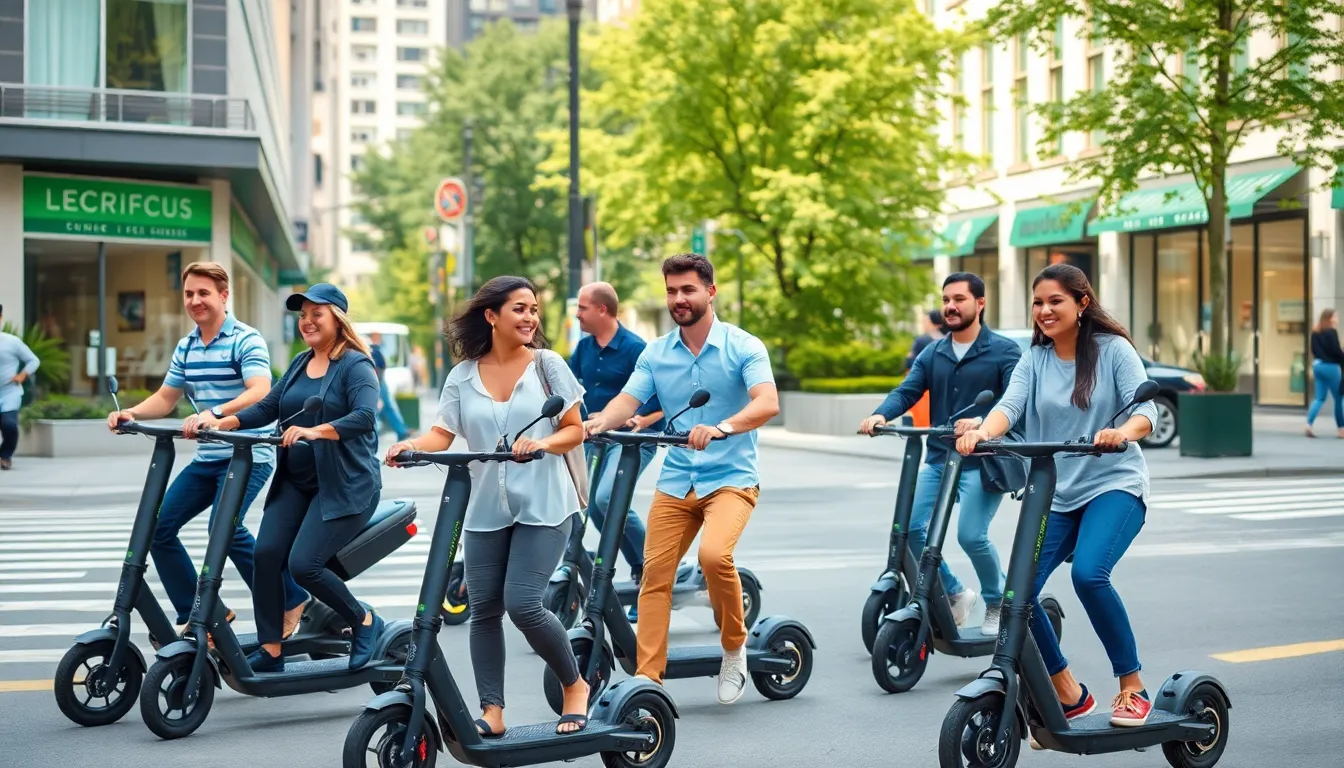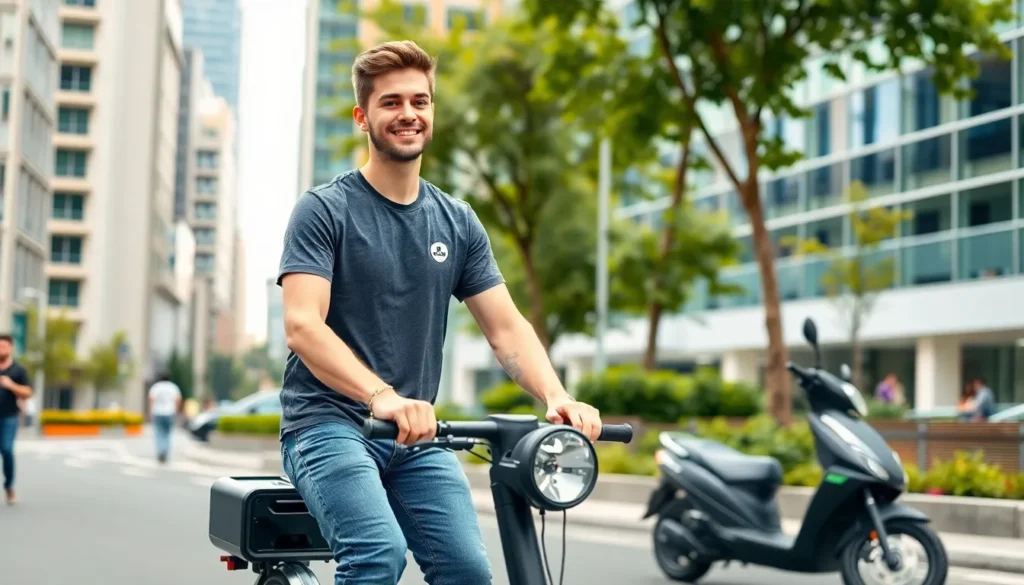In urban landscapes where traffic congestion and pollution are pressing concerns, electric scooter sharing has emerged as a game-changer. These eco-friendly alternatives not only provide a convenient way to navigate city streets but also promote sustainable transportation. As cities become more crowded, the demand for quick and efficient travel options continues to rise, making electric scooters an attractive solution.
With the click of a smartphone app, riders can easily access a fleet of scooters parked around their neighborhoods. This innovative mode of transport not only reduces the need for cars but also encourages a healthier lifestyle. As electric scooter sharing gains momentum, it’s reshaping how people think about commuting and exploring their cities.
Table of Contents
ToggleOverview of Electric Scooter Sharing
Electric scooter sharing has emerged as a significant transportation option in many urban areas. This service allows users to rent electric scooters for short trips, providing an accessible alternative to traditional forms of transport. By using mobile apps, users quickly locate nearest scooters, monitor availability, and unlock them with ease.
Electric scooters promote sustainability by reducing carbon emissions. According to a study by the Institute for Transportation and Development Policy, shared electric scooters can substitute car trips, contributing to a decrease in air pollution and traffic congestion. Riders benefit from lower transportation costs compared to taxis or personal vehicles.
Operationally, electric scooter sharing relies on partnerships with local governments to ensure safety and regulation compliance. Cities implement designated parking zones and required operating speeds to enhance user safety and prevent sidewalk congestion. Companies like Lime, Bird, and Spin lead the market, continually innovating to improve user experience and fleet efficiency.
User demographics show that electric scooter sharing appeals primarily to younger adults seeking fast and flexible travel options. Research indicates that 70% of scooter users are between 18 and 34 years old, which highlights its popularity among urban commuters and students.
Challenges persist, such as scooter maintenance and vandalism. Operators actively monitor their fleets through GPS tracking and data analytics, ensuring scooters remain functional and accessible. Despite these challenges, electric scooter sharing continues to grow, integrating into many cities’ public transit systems and contributing to an evolving, sustainable urban landscape.
Benefits of Electric Scooter Sharing

Electric scooter sharing presents multiple advantages, significantly impacting environmental sustainability and enhancing economic opportunities for users.
Environmental Impact
Electric scooter sharing significantly reduces carbon emissions by substituting short car trips with zero-emission transportation. According to studies, one shared scooter can prevent the release of nearly 1,000 kilograms of CO2 per year. By promoting eco-friendly commutes, electric scooters help decrease air pollution levels, improving urban air quality. Furthermore, their minimal land footprint supports efficient use of public spaces, contributing to sustainable urban planning.
Economic Advantages
Electric scooter sharing offers economic benefits to users through lower transportation costs. Riders save on fuel, parking fees, and maintenance associated with personal vehicles. Studies indicate that users pay approximately $1 to $2 per ride, compared to the average $10 for taxi or rideshare services. Local economies also benefit from increased mobility, leading to higher foot traffic in commercial areas. Cities can capitalize on reduced infrastructure costs, as fewer cars on the road decrease the need for extensive parking facilities and road maintenance.
Challenges Faced by Electric Scooter Sharing
Electric scooter sharing faces several challenges that impact its effectiveness and user experience. Two primary areas of concern include safety and regulatory compliance.
Safety Concerns
Safety remains a critical issue in electric scooter sharing. Accidents involving scooters can lead to injuries for riders and pedestrians alike. In 2020, the National Highway Traffic Safety Administration reported over 1,500 injuries related to e-scooters in the United States. Factors contributing to these incidents include high speeds, lack of protective gear, and road conditions. Users often ride without helmets, which significantly increases the risk of serious injuries. Companies are exploring solutions like mandatory helmet initiatives and app features that promote safe riding practices to address these challenges. Additionally, education campaigns targeting users on safe riding etiquette and scooter operation can enhance safety across urban areas.
Regulatory Issues
Regulatory challenges complicate the growth of electric scooter sharing. Local governments often impose varying rules regarding scooter operations, including restrictions on where users can ride and park scooters. Some cities enforce strict regulations, requiring operators to obtain permits and adhere to specific zoning laws. Compliance with these regulations can limit fleet expansion and operational strategies for electric scooter companies. Coordinating with municipalities to establish standardized regulations presents a viable path forward. Collaborative efforts can help create balanced policies that support safety, accessibility, and growth within the scooter-sharing industry.
Popular Electric Scooter Sharing Companies
Several key players dominate the electric scooter sharing market, each offering unique features and services that set them apart.
Company Profiles
- Lime: Lime operates in over 120 cities worldwide, providing scooters and bikes. The company emphasizes sustainability with vehicles made from recycled materials and promotes responsible use through educational initiatives.
- Bird: Bird prioritizes user experience and safety. It focuses on electric scooters designed for urban commuting, with features like removable batteries for easy charging. Bird’s operations involve partnerships with cities to ensure compliance with regulations.
- Spin: Spin, a subsidiary of Ford, emphasizes accessibility and affordability. It offers a diverse fleet of scooters, including models suitable for different terrains. Spin’s app integrates city-based navigation to help users find nearby scooters efficiently.
- Bolt: Operating mainly in Europe and Africa, Bolt combines electric scooters with ride-hailing services. The company aims to reduce urban congestion and carbon emissions, making it a versatile option for users in various cities.
- Voi: Voi focuses on responsible urban mobility. It operates in several European cities and utilizes a fleet management system that monitors scooter usage to ensure efficient deployments and maintenance.
Market Comparisons
| Company | Active Cities | Fleet Size | Cost per Ride | Special Features |
|---|---|---|---|---|
| Lime | 120+ | 200,000+ | $1 base + $0.15/min | Recyclable materials |
| Bird | 100+ | 160,000+ | $1 base + $0.39/min | Removable batteries |
| Spin | 75+ | 100,000+ | $1 base + $0.15/min | City-based navigation |
| Bolt | 30+ | 50,000+ | $0.75 base + $0.10/min | Integrated ride-hailing |
| Voi | 30+ | 50,000+ | $1 base + $0.20/min | Responsible mobility focus |
Market comparisons highlight differences in operational reach, fleet size, and pricing structures across various electric scooter sharing companies. These distinctions reflect the companies’ strategies to attract diverse user bases while adapting to local regulations and urban environments.
Future of Electric Scooter Sharing
Future developments in electric scooter sharing promise to expand its role in urban mobility. Operators are investing in advanced technologies like artificial intelligence and machine learning to enhance fleet management and user experience. By using these technologies, companies can predict demand patterns, optimize scooter distribution, and reduce operational costs.
Integration with public transportation systems marks another significant trend. Cities can enhance accessibility by allowing electric scooters to complement buses, trains, and subways. This synergy can alleviate congestion and provide seamless transfers for riders. Studies indicate that integrating scooter sharing with existing transit options can lead to increased public transit usage by up to 20%.
Sustainability will continue to drive innovations in electric scooter sharing. Companies are exploring eco-friendly materials for scooter manufacturing and launching initiatives to achieve carbon neutrality. The adoption of renewable energy sources for charging fleets has the potential to further minimize environmental impact and meet global sustainability goals.
Expansion into underserved areas represents a vital future direction. Electric scooter sharing can enhance mobility in communities lacking adequate transportation options. Tailoring services to meet the needs of diverse demographics will maximize ridership and promote inclusivity in urban transportation networks.
Partnerships between scooter companies and local governments will shape regulations and safety standards. Implementing comprehensive safety measures, such as improved infrastructure and designated lanes for scooters, can protect riders and pedestrians. Major studies suggest that cities providing dedicated scooter lanes see a reduction in accidents by over 30%.
Emerging business models, like subscription-based services, are becoming more prevalent. These models offer riders affordable access to electric scooters and create predictable revenue streams for operators. As the market matures, innovations in fleet management and user engagement will likely emerge.
As electric scooter sharing continues to evolve, monitoring key trends and regulatory changes will prove essential. Stakeholders must stay adaptable to leverage market opportunities and address challenges effectively. The future landscape of electric scooter sharing will likely feature enhanced convenience, safety, and environmental consciousness, promoting its adoption as a primary urban transit solution.
Electric scooter sharing is transforming urban transportation by offering a sustainable and efficient alternative to traditional travel methods. As cities grapple with congestion and pollution, these scooters present a viable solution that aligns with the growing demand for eco-friendly mobility options.
The collaboration between scooter companies and local governments is crucial for establishing safety standards and regulations that support this innovative mode of transport. With advancements in technology and a focus on user experience, the future looks promising for electric scooter sharing.
As it continues to integrate into public transit systems and expand its reach, this service not only enhances mobility but also contributes positively to urban environments. The ongoing evolution of electric scooter sharing will play a significant role in shaping the future of urban commuting.




